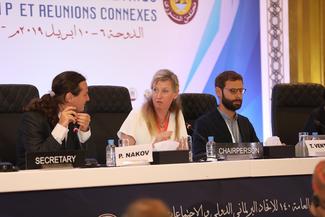- ImpactWe help parliaments to become greener and to implement the Paris agreement.We support democracy by strengthening parliamentsWe work to increase women’s representation in parliament and empower women MPs.We defend the human rights of parliamentarians and help them uphold the rights of all.We help parliaments fight terrorism, cyber warfare and the proliferation of weapons of mass destruction.We encourage youth participation in parliaments and empower young MPs.We support parliaments in implementing the SDGs with a particular focus on health and climate change.
- ParliamentsNearly every country in the world has some form of parliament. Parliamentary systems fall into two categories: bicameral and unicameral. Out of 190 national parliaments in the world, 78 are bicameral (156 chambers) and 112 are unicameral, making a total of 268 chambers of parliament with some 44,000 members of parliament. IPU membership is made up of 180 national parliaments
Find a national parliament
We help strengthen parliaments to make them more representative and effective. - EventsVirtual eventThe International Court of Justice (ICJ) was constituted under the United Nations Charter to help nations settle disputes peacefully in accordance with international law.
- Knowledge
Discover the IPU's resources
Our library of essential resources for parliamentsGlobal data for and about national parliamentsLatest data and reports about women in parliamentResolutions, declarations and outcomes adopted by IPU MembersRecent innovations in the way parliaments workThe latest climate change legislation from the London School of Economics' database
Key conclusions from the April 2019 expert hearing on disinformation and "fake news"

The panel at the hearing on fake news. © IPU/Aboos Images
Innovation Tracker, Issue 2, 28 June 2019
The expert hearing on parliamentary action to combat disinformation and "fake news" was organized on 9 April 2019 during the 140th IPU Assembly by the Standing Committee on Democracy and Human Rights, with the Vice-President of the Standing Committee Ms. Arda Gerkens (Netherlands) in the chair. The experts were Mr. Tommaso Venturini (France), Centre for Internet and Society, Centre national de la recherche scientifique (CNRS); Ms. Shalini Joshi (India), Verification specialist at Proto and co-founder of Khabar Lahariya, India's only digital rural news network; and Mr. Preslav Nakov (Qatar), Principal Scientist, Qatar Computing Research Institute (QCRI). Here are four key conclusions, as captured by Tommaso Venturini.
"Junk" rather than "fake" news
The most important outcome of the hearing was to extend the reflection from the narrow issue of the news hoaxes circulating online to the larger and thornier problem of the quality of public debate online. Such problems, all the experts agreed, could not be solved by simply detecting and removing problematic contents, but needed to be addressed by questioning the very infrastructures of online communication and the way in which they contributed to the degradation of online political conversation. To designate that larger issue, Venturini proposed the expression "junk news", which (in analogy with junk food) highlighted the addictive nature of that type of misinformation and drew attention to the industrial system assuring its production. Similarly, Nakov underlined that the economic incentives to capture the attention of online users were, to a large extent, responsible for the increasing visibility of provocative and divisive discourses.
Harmful is not illegal
Several interventions from the audience pointed to the importance of finding ways to address junk news without limiting the freedom of speech in online and offline media. The Chair Arda Gerkens proposed that a distinction be made between "harmful" and "illegal" online contents which was deemed very useful. Though the separation between the two is sometimes difficult to draw, it would be a mistake to address them in the same way. While "illegal" contents (i.e. supporting violence, terrorism or other criminal actions) should be identified and removed using existing regulation, the same policing solution should not be applied to junk contents, which could not be removed individually (which would be impossible and close to censorship), but should rather be opposed by addressing their economic and technical roots.
Transparence of platforms’ algorithms and business models
A wide consensus also emerged between the panellists and the audience on the fact that social media platforms constituted an essential part of the problem and needed to be made accountable for the consequences generated by their technological and commercial infrastructures. In line with the harmful/illegal separation discussed above, platforms should not be asked to monitor or filter junk news (becoming a sort of "Ministry of Truth" in the words of Nakov), in the same way as they may be asked to act on illegal contents. Instead the first step toward accountability is forcing platforms to be more transparent on their business models (who buys their advertisement space, for what messages, at what time and at what price, etc.) and on their filtering and recommendation algorithms. As long as policy-makers lack precise information on the economic and technical functioning of online platforms, they will not be able to regulate their action effectively.
Journalism as rampart of a healthy public debate
The best antidote against the degradation of public debate and the rise of junk news remains the work of serious investigative journalists. Here again, the advent of social media platforms has been highly consequential, increasingly draining the advertisement revenues of traditional journalism. At the same time, however, digital media reduce the cost of news distribution and therefore allows the creation of a multitude of independent and grassroot news initiative. Local, self-organized, bottom-up reporting initiative, such as the one presented by Joshi, should be cherished by countries which should provide them the support they need but with minimum interference with their freedom and independence.




